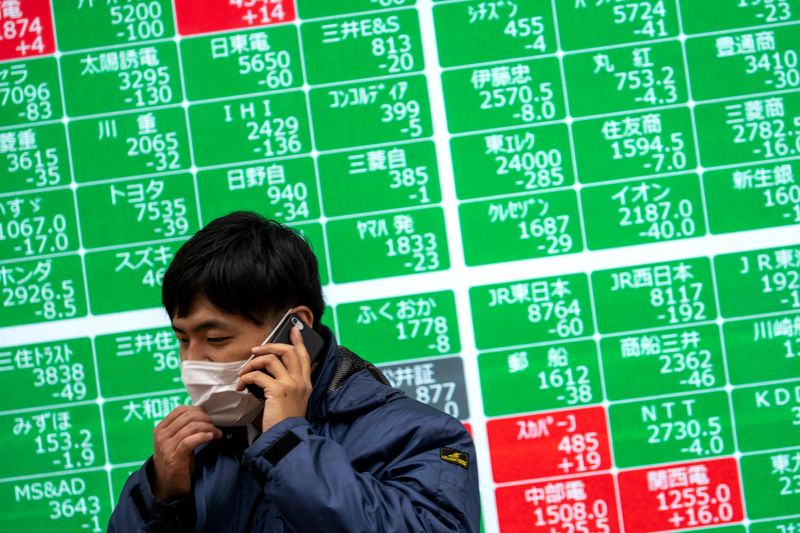https://news.google.com/__i/rss/rd/articles/CBMibWh0dHBzOi8vd3d3LmludmVzdGluZy5jb20vbmV3cy9lY29ub215L29pbC1hbmQtZXVyby1zbGlwLW1hcmtldHMtb24tZWRnZS1vdmVyLWNvdmlkMTktY3VyYnMtaW4tZXVyb3BlLTI2ODYzNzDSAQA?oc=5
 EconomyNov 22, 2021 04:51PM ET
EconomyNov 22, 2021 04:51PM ET

© Reuters. FILE PHOTO: A man wearing a protective face mask, following an outbreak of the coronavirus, talks on his mobile phone in front of a screen showing the Nikkei index outside a brokerage in Tokyo, Japan, February 26, 2020. REUTERS/Athit Perawongmetha/File Ph
By Chris Prentice and Saikat Chatterjee
WASHINGTON/LONDON (Reuters) – Wall Street retreated from record highs on Monday, and shares of lenders rallied as two-year U.S. Treasury yields rose after President Joe Biden tapped Jerome Powell to continue as Federal Reserve chair.
European shares were flat, under pressure from fears of a resurgent coronavirus pandemic.
The and touched all-time highs before ending lower. The S&P 500 lost 0.32% to end at 4,682.88 points, while the Nasdaq Composite finished down 1.26%, at 15,854.76 amid losses in technology stocks.
The rose 17.28 points, or 0.05%, to 35,617.83.
Biden nominated Powell as chair and Lael Brainard, the other top candidate for the job, as vice chair. Powell’s current term has proven positive for risk assets, with the S&P gaining 69.7% since his appointment.
The S&P 500 banks index gained.
“The nominations signal continuity for policy at a critical time for the economy,” said Arthur Hogan, chief market strategist at National Securities in New York.
The U.S. dollar rose 0.52% against a basket of other major currencies.
The pan-European index finished flat after falling earlier in the day when German Chancellor Angela Merkel said Europe’s biggest economy needed tighter restrictions to control a wave of COVID-19 inflections. MSCI gauge of European shares fell 0.6% as traders weighed the likely impact of fresh European COVID-19 restrictions on economic prospects.
Europe’s “growth potential is being derailed by COVID right now. You’re seeing flows back to the United States as a result,” said Edward Moya, senior market analyst at brokerage OANDA.
French health authorities reported 5,266 daily new COVID-19 infections, pushing the seven-day moving average of new cases to an almost three-month high.
Austria powered down public life as its fourth national COVID-19 lockdown began.
High frequency data has already shown the European economy struggling to gain traction relative to its U.S. counterpart.
MSCI’s broadest index of Asia-Pacific shares outside Japan fell 0.11%.
The euro fell 0.57% and touched the lowest in more than 16 months. The common currency has been the prime mover in markets over recent sessions as investors bet Europe’s economy will lag the U.S. recovery.
U.S. Treasury yields rose, with the two-year yield, which typically moves in step with interest rate expectations, hitting its highest level since early March 2020.
Fed Vice Chair Richard Clarida said last week that quickening the pace of tapering might be worth discussing at December’s meeting. Minutes of the Fed’s November meeting are due for release on Wednesday.
In commodities, gold prices were under pressure as Powell’s nomination drove expectations that the central bank will stay the course on tapering economic support. Spot prices were down 2.16% by 4:23 EST (2124 GMT) and U.S. settled 2.4% lower at $1,806.30.
Oil prices rebounded from recent losses on reports that OPEC+ could adjust plans to raise oil production if large consuming countries release crude from their reserves or if the coronavirus pandemic dampens demand.
settled up 1.03% at $79.70 a barrel and finished up 1.07% to $76.75 per barrel.
“The Biden administration is serious about tackling inflation and we’re not going to have runaway inflation kill the U.S. economy,” OANDA’s Moya said, citing the expected tapping of strategic petroleum reserves.
dropped 4.5%, extending its rout after posting its worst week in two months last week.
Related Articles
Disclaimer: Fusion Media would like to remind you that the data contained in this website is not necessarily real-time nor accurate. All CFDs (stocks, indexes, futures) and Forex prices are not provided by exchanges but rather by market makers, and so prices may not be accurate and may differ from the actual market price, meaning prices are indicative and not appropriate for trading purposes. Therefore Fusion Media doesn`t bear any responsibility for any trading losses you might incur as a result of using this data.
Fusion Media or anyone involved with Fusion Media will not accept any liability for loss or damage as a result of reliance on the information including data, quotes, charts and buy/sell signals contained within this website. Please be fully informed regarding the risks and costs associated with trading the financial markets, it is one of the riskiest investment forms possible.





















